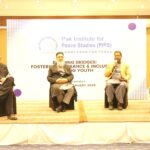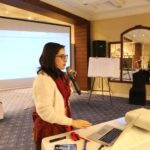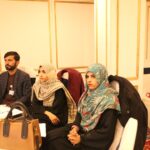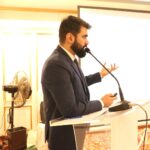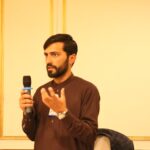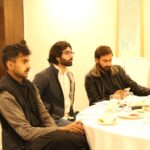Promotion of certain narratives for political interests affect Pakistan’s diversity
The Pak Institute for Peace Studies (PIPS) organized a two-day workshop on January 20-21, 2025, in Faisalabad, titled “Building Bridges: Fostering Tolerance and Inclusivity among Youth.” It was the fourth in a series of ten two-day training workshops being implemented by PIPS, with an aim of mitigating faith-based persecution and violence by building the capacity of local peace actors and youths. The workshop brought together a diverse group of participants, including teachers and students from the institutions of mainstream and religious education, human rights activists, and professionals from various fields. The event engaged young minds in thoughtful and constructive dialogue on critical themes, including inclusivity, citizenship rights, the constitution, cultural diversity, responsible social media use for a safer society, gender equality, and the importance of future planning.
The event commenced with a brainstorming session by the Project Manager PIPS, Muhammad Murtaza titled “Why this Workshop?”. He engaged the participants in an interactive activity to gauge their knowledge regarding inclusivity, diversity, and tolerance. He defined the technicalities of the terms and emphasized their importance in fostering a safe, progressive, and prosperous society. Concluding the session, he remarked, “We believe that youth are agents of change.” He underscored the need for their actions to promote tolerance within society, thereby creating an atmosphere of peaceful coexistence.
It was followed by a session on “Constitution, Parliament and Citizenship” by senior journalist Imran Mukhtar. Mr. Mukhtar explained the importance, roles and responsibilities of the three entities. He also educated the participants about the composition and role of oversight bodies of the parliament. He rounded off the session by engaging with the audience in a discussion about citizen portal and lagged judgement on the cases.
The next session featured a panel discussion titled ‘What is Diversity? Why is Acceptance Necessary?’ The panelists included Dr. Ammar Khan Nasir, a religious scholar and Head of the Department as well as Assistant Professor at the School of Arts and Social Sciences, GIFT University, Gujranwala; Mufti Muhammad Zahid, Vice President of Jamia Islamia Imdadia, Faisalabad; Professor Anjum James Paul, Associate Professor of Political Science at Government Post Graduate College, Samundri; and Muhammad Amir Rana, President of PIPS.
Mufti Muhammad Zahid said diversity and acceptability were not a challenge in the society, but some elements had become a hurdle in their way. “Ever-increasing frustration in the society due to economic, political and other reasons are a challenge for diversity,” he said, adding that promotion of certain narratives on social media was affecting both diversity and acceptability.
Maulana Ammar Khan Nasir viewed that diversity itself was accepted in the political and religious landscape of Pakistan. “The issue is that some narratives are promoted in the society to enhance political strength, decreasing the space for diversity and acceptability,” he noted. He said the exaggeration of conflict to promote a certain political ideology also played a role in decreasing the space for acceptability.
Anjum James Paul said hatred-based literature in the curriculum created an intolerant mindset. “As long as we will not give space to one another, the challenges for diversity and acceptability will not be over,” he said.
The next session was conducted by senior journalist Imran Mukhtar on ‘Combating Fake News and Fostering Safe Spaces on Social Media’. He elaborated on how fake news, misinformation, and disinformation can incite mob frenzy and lead to violence. He emphasized the importance of fostering awareness, sensitizing communities, and encouraging adaptability according to the times while upholding the rule of law.
President of PIPS, Muhammad Amir Rana, conducted an interactive session in which participants were encouraged to reflect on and share their positive and negative qualities, followed by an analytical discussion. The session concluded with an emphasis on the notion that dishonesty serves as the root cause of all societal evils.
In the next session, PIPS Research Officer Hina Khaliq Taj discussed the importance of integrating women into the country’s workforce. She emphasized that doing so would not only grant them their rightful employment opportunities but also contribute to achieving economic sustainability at both the domestic and national levels.
The subsequent session was led by political activist and lawyer Dileep Doshi on ‘Cultural and Ethnic Diversity of Pakistan.’ He highlighted the importance of fostering a mindset of acceptance toward individuals from diverse cultural, linguistic, ethnic, and religious backgrounds. “Things should evolve in the society and the lens of evolution should be progressive and not rigid,” he said, noting that youth should explore different diversities of Pakistan.
Next, PIPS Research Officer Esham Farooq facilitated an interactive session titled “Using Common Sense”. She provided a brief explanation of common sense, connecting it to the themes of diversity and inclusivity. Following this, she divided the participants into five groups and tasked them with resolving five conflict scenarios using common sense.
In his concluding remarks, PIPS President Muhammad Amir Rana encouraged the youth to approach issues critically and apply common sense to foster rational thinking. He emphasized that critical thinking requires practice, analysis, and refinement, serving as a valuable tool for navigating life’s challenges.






